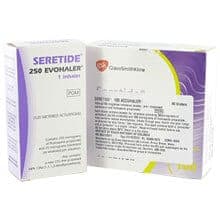Login to your account
- Prescription included
- Genuine medication
- All-inclusive service - No hidden fees
- Free next-day delivery
Asthma
Get asthma medication with an online prescription
Asthma is a lung condition that causes inflammation and narrowing of the airways, making it difficult to breathe. Although it is a chronic condition, asthma can be managed through an effective treatment plan, usually including medication such as inhalers.
You can purchase preventer and reliever inhalers for asthma online from euroClinix online. Start by completing a quick, free and easy online consultation. This will ensure you receive the right medication by helping our doctors determine whether or not the treatment is appropriate for you. Our service does not require a face-to-face appointment and includes free next-day delivery on orders made before 4.30pm.
Available Treatment(s)

- Treats severe asthma and COPD attacks
- Effective inhaler for emergency attacks
- Available as an evohaler and accuhaler
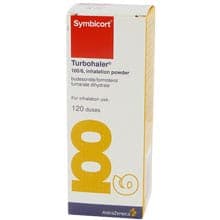
- Reduces airway inflammation
- Improves asthma symptoms
- Contains two active ingredients
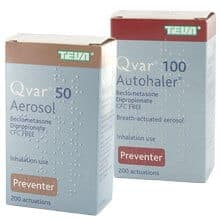
- Prevents the symptoms of an asthma attack with daily use
- Choice of three types: Autohaler, Aerosol and Easi-Breathe
- Effective in conjunction with a regular reliever inhaler
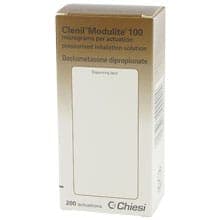
- Controls asthma symptoms and prevents attacks
- Dispensed in a pressurised inhaler
- Contains an anti-inflammatory steroid to reduce the swelling caused by an attack
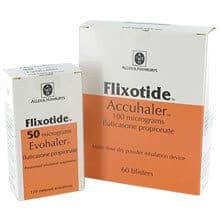
- Reduces swelling and irritation in the airways
- Daily use reduces the risk of asthma attacks
- Available to buy as an Accuhaler or Evohaler
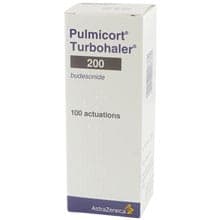
- Effective preventer inhaler
- Used daily to manage asthma and COPD
- Reduces inflammation in the airways
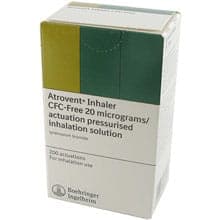
- Fast-acting inhaler
- Used daily to improve symptoms
- Eco-friendly choice
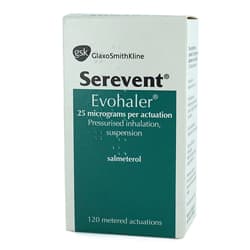
- Relief for up to 12 hours
- Effectively reduces symptoms
- Highly effective for nocturnal asthma
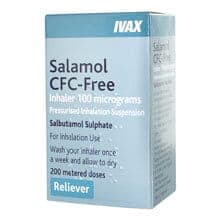
- Quickly relieves symptoms caused by an attack
- Contains the active ingredient salbutamol
- Treats chronic obstructive pulmonary disease (COPD)
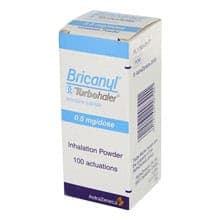
- Relieves asthma and COPD symptoms
- Works within 5 minutes
- Opens the airways
What is asthma?
Asthma is a chronic (long-term) inflammatory condition that affects the airways and cells in the lungs, leading to breathing difficulties. Symptoms can be mild or severe, and may happen daily or only occasionally. They typically include wheezing, breathlessness and tightness in the chest, and be worse at night or in the early morning. Certain things, known as 'triggers', can worsen symptoms, causing what is known as an asthma attack. Asthma can be managed effectively with the appropriate treatment plan.
What causes asthma?
The exact cause of asthma is unknown. Asthma is usually diagnosed in childhood and tends to run in families. A family history of other allergies, such as eczema and hayfever, can also increase the likelihood of asthma. Although some people stop getting asthma in childhood, it affects people of all ages, with 1 in 12 adults in the UK receiving treatment for asthma.
It is often due to an immune response. The body's immune system works to fight against potential threats, but occasionally may overly react in the presence of compounds that are usually unharmful, known as allergens. Some people may have a strong reaction while others may not react at all. Allergies are usually caused when an immune response is excessive.
Our immune system reacts to allergens by triggering inflammation. During an inflammatory response, white blood cells work to protect the body from infection by foreign particles. For those with asthma, a trigger can cause the airways to swell, constrict and create more mucous, making breathing difficult. Muscles around the airways can tighten as well, known as a bronchospasm, making it even more difficult to breathe.
Asthma is usually first diagnosed through a spirometry test, a type of lung function test that involves breathing into a machine before and after taking asthma reliever medication.
What causes asthmatic symptoms?
Asthma symptoms occur when someone with the condition comes into contact with an irritant like pollen or smoke.
The linings of the airways will become inflamed, the muscles around the airways tighten, and your body may produce more mucous, causing airflow to become restricted. The things that cause asthmatic symptoms and asthma attacks are known as 'triggers'.
What are the most common asthma triggers?
Asthma triggers vary between people, but common triggers include:
- allergies, such as hay fever or allergens like pet dander, mould, cockroaches, and house dust mites
- changes in weather, including changes in humidity, cold air, and thunderstorms
- irritants, such as strong fragrances, chemical fumes, or cigarette smoke
- physical exercise, such as high-intensity cardiovascular exercise
- emotional changes that cause changes in breathing patterns, like laughing or crying
- illnesses, including respiratory infections such as colds or the flu
- environmental factors, such as poor air quality from air pollution
- medications, such as aspirin
While some triggers may be avoidable, others, such as air pollution or second-hand tobacco smoke are not, which is why it is important to always carry your reliever inhaler. Over time, you will begin to understand your triggers and be able to more effectively reduce the likelihood of an attack.
What is exercise-induced asthma?
Exercise-induced asthma occurs when the airways in the lungs narrow from strenuous exercise, leading to shortness of breath, wheezing and coughing during or shortly after exercise. It can be worse when breathing in cold, dry, air. With the right treatment plan in place, people with this form of the condition can remain active.
What are the symptoms of asthma?
Common asthma symptoms include:
- wheezing (a whistling sound when you exhale)
- coughing
- lightheadedness
- breathlessness
- chest tightness
- an inability to draw a deep breath
The severity of symptoms can differ between people. Some people may only experience symptoms occasionally, while people with severe asthma may find it difficult to breathe most of the time.
What are the symptoms of an asthma attack?
An asthma attack involves worsening of symptoms for a short period of time.
Signs of an attack include:
- severe, constant wheezing, coughing and chest tightness
- asthma symptoms that prevent you from speaking, eating or sleeping
- breathing faster than normal or feeling like you are out of breath
- a rapid heartbeat
Asthma attacks can be life-threatening. If you are experiencing signs of confusion or cannot walk or talk from difficulty breathing, use your reliever inhaler and seek immediate medical attention.
How can I manage my asthma?
You can take control of your asthma by following your asthma action plan, an individualised guide that your GP or asthma nurse will help you create to prevent your condition from getting worse.
It may include things like taking your medications as prescribed, knowing and avoiding your triggers, and taking readings on a peak flow meter to monitor your condition and make sure it is not worsening.
Symptoms that indicate your asthma may need further review or treatment include:
- noticing that you wheeze or cough more often
- having a tight chest
- finding it hard to keep up with your normal routine of exercise
- using your blue reliever inhaler more than 2-4 times a week
- tiredness
You should make an urgent appointment with your GP or asthma nurse if you think your symptoms are becoming worse.
How can I prevent an asthma attack?
While asthma attacks are not entirely preventable, you can take steps to reduce your chances of having an attack.
This includes:
- taking all medications as prescribed
- having yearly reviews with your GP or asthma nurse
- avoiding potential triggers when possible
- following your asthma action plan
- ensure that all medications are in date
You should always carry your reliever inhaler with you in case of an attack and get emergency treatment if necessary - a severe asthma attack can be fatal.
What treatments are available?
Asthma medication often comes in the form of inhalers.
There are many different types of inhalers available. Inhalers can be classified as either preventer or reliever inhalers. Most people diagnosed with asthma will first be given a reliever inhaler to use as needed. These relax the airways, allowing airflow to return to normal during an attack.
If you experience asthma symptoms quite frequently, you will likely be prescribed a preventer inhaler. These are used daily and lower the sensitivity of the airways so they are less likely to react to irritants.
If your asthma is severe, you may need a nebulizer, oral steroids, or injections.
Reliever inhalers
Reliever medications provide quick relief during or before an attack by opening the airways, making it easier to breathe. They are usually bronchodilators, like Ventolin, the most common type of inhaler. Reliever inhalers are sometimes prescribed in a preventative sense to people who experience exercise-induced asthma.
You should always keep your reliever inhaler on you in case of an attack.
Depending on the severity of your asthma, you may be prescribed a preventer treatment in addition to a reliever inhaler.
Preventer inhalers
Preventer inhalers are designed for long-term control of asthma symptoms. For those with moderate to severe asthma, they can reduce the frequency and severity of attacks. Preventer inhalers contain corticosteroids which reduce inflammation and make the airways much less responsive to the effects of asthma triggers. Unlike relievers, preventers don't provide immediate relief. They need to be used daily to allow enough time for the medication to build up in your system and become effective.
In addition to inhalers, there are other types of preventative treatments for asthma. These usually contain a variant of steroid that is able to fight inflammation in the airways. Although they can be taken orally or injected, they are most commonly prescribed in an inhaled form for everyday use.
Certain long-term preventers and short-term reliever inhalers can be used together, others cannot. Your doctor will advise you on which combination will be the most effective for your condition.
Types of asthma inhalers
Metered dose inhalers

Metered dose inhalers deliver medication through a pressurised aerosol canister. The medication is released into the mouth as the inhaler is activated. Depending on the brand, these may be called Evohalers, Autohalers, Easi-Breathe inhalers or aerosols. Ventolin is the most commonly prescribed metered dose inhaler. Other common metered dose inhalers include:
Flixotide and Qvar are also available in different forms.
Typically, metered dose inhalers contain a compressed version of the active ingredient to be inhaled as the aerosol canister is held down. This is the case with the Evohaler and aerosol inhalers. The Autohaler and Easi-Breathe inhaler are breath-actuated inhalers, meaning they do not need to be pushed as you inhale. To use a breath-actuated inhaler, open the air vents and breathe in to activate the release of a spray of medication.
These are generally easy to use, but those who may find it difficult to operate an aerosol inhaler, such as young children or people with arthritis, might find it easier to use a dry powder, Easi-Breathe inhaler, Autohaler or Evohaler.
Those with a lactose allergy may not be able to use some dry powder inhalers, in which case a metered dose inhaler is a better option.
Dry powder inhalers

Dry powder inhalers are easier to use than metered dose inhalers, as they do not require too many actions to be performed at once. Two common types of dry powder inhalers are the Turbohaler and the Accuhaler.
Common dry powder inhalers include:
These are used by opening a mouthpiece and either pulling a lever or twisting the base of the inhaler, allowing a dose of dry powder medication to be released. After this, the dry powder is simply inhaled.
Dry powder inhalers are usually easy to operate, giving an accurate indication of how many doses of medication are left.
Accuhalers usually contain lactose, and may not be suitable for everybody.
Can I order asthma treatment online?
You can purchase asthma treatment online from euroClinix. To ensure that your chosen treatment is suitable for you, you will need to complete a simple online consultation. Once approved by our doctors, they will issue a prescription and our UK pharmacy will dispense and deliver it with free next-day delivery.
Select
medicationFill out a short
medical formDoctor issues
prescriptionMedication sent
from pharmacy

